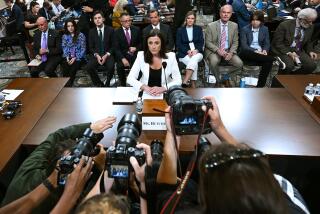Didn’t Try to Intentionally Mislead, McFarlane Says
- Share via
WASHINGTON — Former National Security Adviser Robert C. McFarlane conceded memory lapses and “some tortured language” but denied suggestions today that he had intentionally misled Congress and Atty. Gen. Edwin Meese III about details of the Iran- contra affair.
McFarlane, appearing under oath for the second full day at the House-Senate hearings, parried close questioning from House committee counsel John Nields, who appeared to be trying to determine whether there had been a cover-up after the outlines of the affair became public last Nov. 25.
In a typical response, McFarlane answered a question about whether he attended a meeting about foreign contributions to the Nicaraguan contra rebels: “I am willing to accept that (I was there) because I am told I should be as supplicatory as I can. I doubt that it happened. . . . I can conceive that I might have been a party to it, but I doubt it.”
McFarlane’s testimony is considered important because of his almost daily contact with President Reagan from October, 1983, through December, 1985, while McFarlane was the President’s national security adviser. After that, McFarlane worked closely with then-National Security Council aide Lt. Col. Oliver L. North and with Rear Adm. John M. Poindexter, who succeeded McFarlane in his White House post.
Denies Adjusting Stories
McFarlane, under cross-examination from Nields, denied that he, Poindexter and North have adjusted their stories to say they were unaware that Israel was shipping U.S.-made missiles to Iran in November, 1985, as part of a plan to gain the release of U.S. hostages.
A chronology that all three contributed to, prepared for use by White House officials last November, said the shipment contained oil drilling parts rather than weapons.
McFarlane testified that he told Meese last November he was under the impression at the time of the November, 1985, shipment to Iran that it contained oil drilling material. He said he told Meese--then gathering facts about the Iran-contra affair--he did not learn the true nature of the shipment until May, 1986.
But he also said Meese told him Secretary of State George P. Shultz had told investigators that Shultz and McFarlane had discussed the shipment of missiles at the time it was made.
“I said, ‘I can understand that, and I’ll accept it. I have no clear recollection of it,’ ” McFarlane said today.
“But there wasn’t any effort to deny it. It was simply to say that I didn’t recall what happened.”
Denied Any Knowledge
McFarlane was reminded that during testimony before the House Foreign Affairs Committee last Dec. 8 he denied any knowledge of or role in obtaining donations for the contras from other countries.
McFarlane also said at that earlier hearing that he didn’t know that a so-called “country two,” believed to be Saudi Arabia, had contributed $32 million to the rebels.
“In fact, you did have a pretty good idea of ‘country two’s’ funding of the contras, didn’t you?” Nields asked.
“Yes,” McFarlane said, adding, “I was trying to use some tortured language, inappropriately, I think, but to comment that I did not know the extent. To be technically accurate, I did not and do not today, but I take your point, Mr. Nields; it wasn’t a full account.”
More to Read
Get the L.A. Times Politics newsletter
Deeply reported insights into legislation, politics and policy from Sacramento, Washington and beyond. In your inbox twice per week.
You may occasionally receive promotional content from the Los Angeles Times.










